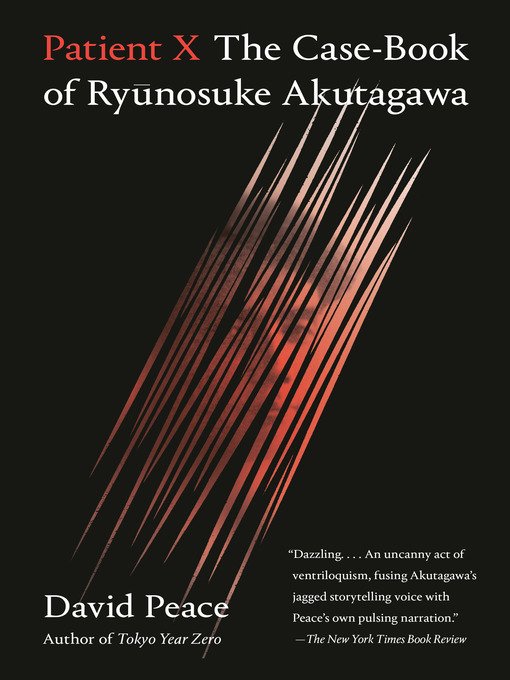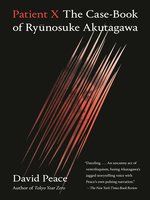by David Peace
Available formats-
- OverDrive Read
- EPUB eBook
Edition-
Subjects-
Languages:-
Copies-
-
Available:1
-
Library copies:1
Levels-
-
ATOS:
-
Lexile:
-
Interest Level:
-
Text Difficulty:
Excerpts-
-
From the book
1
And now, children, let me tell you a story about Gautama and Jesus.
It begins one day as Gautama is strolling in Paradise by the banks of the Lotus Pond. The blossoms on the pond are perfect white pearls, and from their golden centres wafts a never-ending fragrance. I think it must have been dawn in Paradise.
But as Gautama was strolling he heard the sound of weeping, a most unusual sound in Paradise. Gautama stepped down towards the edge of the pond and there, before the blossoms, amidst the fragrance, he saw Jesus kneeling beside the pond, by the water, staring down through the spreading lotus leaves to the spectacle below. For directly beneath the Lotus Pond of Paradise lie the lower depths of Hell, and as Jesus peered through the crystalline pool, he could see the River of Sins and the Mountain of Guilt as clearly as if he were viewing pictures in a peep-box.
And he was weeping at what he saw:
Down there was a man named Ryūnosuke, who was writhing in Hell with all the other sinners. This man had once been an acclaimed author but he had led a most selfish life, hurting even the people who loved him.
But now Gautama recalled how Ryūnosuke had performed at least one single act of kindness. Idling beside the Shinobazu Pond one day, Ryūnosuke had noticed a small spider creeping along the wayside. His first thought had been to stamp it to death, but as he raised his foot, he told himself, “No, no. Even this tiny creature is a living thing. To take its life for no reason would be too cruel.”
And so Ryūnosuke let the spider pass him by unharmed.
Hearing Jesus weeping, seeing his tear-stained face, Gautama decided to reward Ryūnosuke by delivering him from Hell, if possible. And, by happy chance, Gautama turned to see a heavenly spider spinning a beautiful thread atop a lotus leaf the colour of shimmering jade. Gently lifting the spider thread, Gautama handed it to Jesus. And now Jesus lowered the thread straight down between the white blossoms, through the crystal waters to the depths far, far below.
2
Here, with the other sinners at the lowest point of the lowest Hell, Ryūnosuke was endlessly floating up and sinking down in the River of Sins. Wherever he looked there was only pitch darkness, and when a faint shape did pierce the shadows, it was the glint of a needle on the horrible Mountain of Guilt, which only heightened his sense of doom. All was silent, and when a faint sound did break the silence, it was only the feeble sigh of a fellow sinner. As you can imagine, those who had fallen this far had been so worn down by their tortures in the seven other hells that they no longer had the strength to cry out. Great writer though he once had been, now Ryūnosuke could only thrash about like a dying frog as he choked on his sins.
And then, children, what do you think happened next? Yes, indeed: raising his head, Ryūnosuke chanced to look up towards the sky above the River of Sins and saw the gleaming silver spider thread, so slender and so delicate, slipping stealthily down through the silent darkness from the high, high heavens, coming straight for him!
Ryūnosuke clapped his hands in joy. If only he could take hold of this thread and climb up, then perhaps he could escape from Hell. And maybe, with luck, he could even enter Paradise. Then he would never again be driven up the Mountain of Guilt or plunged down into the River of Sins.
No sooner had the thought crossed his mind than Ryūnosuke grasped the spider thread and started climbing with all his might, higher and higher,...
About the Author-
- David Peace—named in 2003 one of Granta’s Best of Young British Novelists—was born and brought up in Yorkshire. He is the author of the Red Riding Quartet (Nineteen Seventy-Four, Nineteen Seventy-Seven, Nineteen Eighty and Nineteen Eighty-Three); GB84, which was awarded the James Tait Black Memorial Prize; The Damned Utd and Red or Dead, which was shortlisted for the Goldsmiths Prize. The final part of his Tokyo Trilogy—to follow Tokyo Year Zero and Occupied City—will appear after Patient X, his tenth novel. He lives in Tokyo.
Reviews-
-

July 1, 2018
An imaginative glimpse behind the curtain of a sheltered, definitively troubled writer of a century past."In the next life, if there is such a punishment, I wish to be reborn as sand." So says Ry?nosuke Akutagawa (1892-1927), the protagonist and reluctant center of Peace's (Red or Dead, 2014, etc.) latest venture into fact-based fiction--and not as much a departure from his procedurals as one might imagine, either. Presented as a series of sketches, the book proceeds from one turning point to another while emphasizing constant themes, opening with a parable that speaks to Akutagawa's idiosyncratic blending of Buddhism with Christianity; "I am not surprised," says a psychiatrist, archly, when Akutagawa travels to Nagasaki, the most Christian of all Japanese cities, though Akutagawa's interests turn out to be more nuanced than all that. Another constant is Akutagawa's obsession with death, beginning with that opening parable and continuing right up until his own suicide at age 35, having left behind a note complaining about his "vague sense of anxiety." A section of the book finds Akutagawa fascinated by the ritual death of a general and his wife after the death of the emperor, following an ancient though outlawed custom by which a retainer must accompany a master into the afterlife: "the newspapers were all agreed that General Nogi had committed junshi, following his lord into death, and then Shizuko had taken her own life, a true samurai wife following her husband into death." Akutagawa, Peace suggests, may just have been taking a place in that chain of suicides, all in obedience to an emperor whose death signaled the arrival of a "new age, a new era!" in which the writer would not comfortably fit. Though the book is a touch too pensive, it has an elegant poetry to it, even in the horrific passages depicting the great earthquake of 1923.Quiet homage to the progenitor of the modern Japanese short story.COPYRIGHT(2018) Kirkus Reviews, ALL RIGHTS RESERVED.
-

July 9, 2018
In this sly, intermittently arresting novel, Peace (Occupied City) draws on the life and work of Ryu¯nosuke Akutagawa, a Japanese author “dogged with accusations of unoriginality,” to create a sui generis portrait. Peace has written two fictional biographies of British soccer coaches and turns to a more bookish subject here: a tortured writer best known for the short story that was adapted into the Akira Kurosawa film Rashomon. The novel is composed of 12 tales from various periods in Akutagawa’s life, beginning inside his mother’s womb, where he is unsure he wants to be “born into this world.” His noisy birth presages existential agonies: “you scream, alone, alone, you scream and you scream.” In similarly portentous style, Peace narrates the prolific writer’s artistic apprenticeship, spiritual struggle, growing fascination with Christianity, and suicide in middle age. Peace captures his subject’s febrile sensibility, the way literature forms and deforms him. Reading Poe, a major influence, makes Akutagawa feel “the fragility of his mind, so easily, easily fragmented and torn, shattered and ripped into so many, many pieces.” Akutagawa’s own writing is marked by “a frantic intensity, filling the decaying world of this supernatural story with horrific beasts.” Some of the tales capture Akutagawa’s mesmerizing energy, while others are wan, if devoted, homages, making this book most recommendable to fans of Akutagawa. -

August 1, 2018
In another fictionalized memoir, award-winning Peace (Red or Dead?, 2014) turns his attention from British football fields to the early twentieth-century literary world of the highly influential modern Japanese short-story writer, Ryunosuke Akutagawa. The jump in subject reflects Peace's more than 20 years of living in Japan. His admiration for Akutagawa is evident in the numerous sources he scoured to construct the dozen linked stories that touch on the writer's major life events, psychology, and literary talent. Akutagawa is primarily known for writing the story that inspired Kurosawa's classic film, Rashomon (1950). Insights into Japan's pre-WWII history are relayed from a remarkably revealing point of view, given that Akutagawa was raised amid the struggle in Japan to hold onto tradition while coping with modernity and Western influence. Peace's writing in Akutagawa's voice is, at times, disorienting, but this form of literary devotion is not without reward. By combining history, oral tradition, surrealism, and a Poe-like grittiness, the always innovative Peace reimagines the life of a gifted writer who died young by his own hand.(Reprinted with permission of Booklist, copyright 2018, American Library Association.) - The New York Times Book Review "Dazzling. . . . An uncanny act of ventriloquism, fusing Akutagawa's jagged storytelling voice with Peace's own pulsing narration."
- The Japan Times "A lyrical masterpiece that takes up Japan and the circumstances of life in the past, present and beyond. . . . Astounding."
- Financial Times "Superlative: exacting, precise and filled with the suffocating sense of foreboding generated by the master's own best stories. . . . Peace is not simply a masterfully controlled stylist but a magnificently atmospheric one, composing hypnotic collages."
- Counterpunch "One might say that what Peace does with words is impossible to adequately describe with words. . . . [He] has written a biography in fiction. He has assumed Ryūnosuke Akutagawa's writing soul. . . . Yet, the possibility that Peace's fiction is not all his own never enters the reader's mind. To not only attempt such a feat, but to carry it out in a work that is not autobiographical in any shape or form is further proof of Peace's mastery of the art of fiction."
- Ian Sansom, The Guardian "David Peace is not a writer who obeys the usual conventions and assumptions: his work defies expectations. . . . With Patient X, one begins to see that Peace's achievement is not merely as an English prose stylist, or as someone who merges genres, or indeed even as a political writer challenging what appears to be the natural order, but as a transnational figure challenging all categories of containment."
Title Information+
-
Publisher
Knopf Doubleday Publishing Group -
OverDrive Read
Release date: -
EPUB eBook
Release date:
Digital Rights Information+
- Copyright Protection (DRM) required by the Publisher may be applied to this title to limit or prohibit printing or copying. File sharing or redistribution is prohibited. Your rights to access this material expire at the end of the lending period. Please see Important Notice about Copyrighted Materials for terms applicable to this content.
Status bar:




